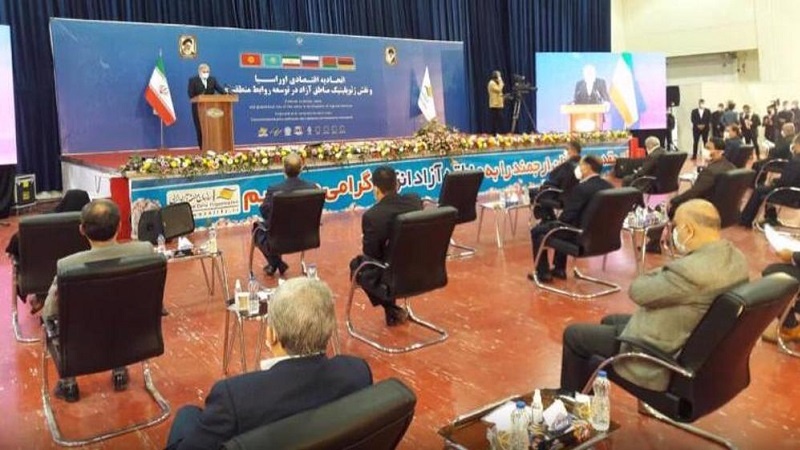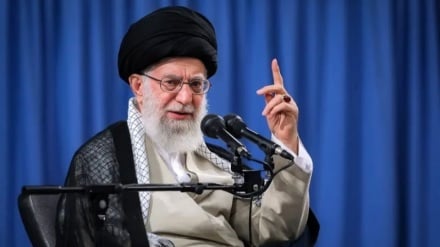Iran, Russia-led trade bloc push regional convergence
Representatives of the Eurasian Economic Union (EAEU), a trade bloc with an integrated market of 180 million people, are attending a conference in Iran’s port city of Anzali on the Caspian Sea to enhance regional convergence in economic and transit relations.
According to Press TV, the union established by Russia, Belarus and Kazakhstan in 2015 has since grown to include Armenia and Kyrgyzstan, with Iran and a number of East Asian and African countries waiting in line to join it.
The gathering in Bandar Anzali, titled International Conference on the Eurasian Economic Union and the Geopolitical Role of Free Zones in the Development of Regional Relations, opened on Tuesday with the in-person and online participation of Iranian officials and entrepreneurs and EAEU representatives.
It is held “to study various aspects of opportunities and challenges facing the implementation of the provisions of the cooperation agreement with the EAEU in a scientific and expert manner and to propose practical and operational solutions for it,” Managing Director of Anzali Free Zone Organization Mohammad Ali Ruzbehan told the opening.
$1.7 billion of trade in six months
The EAEU has sought to increase its trade with partners in West Asia and East Asia in order to profit from the growing trade between Europe and Asia. Current key partners are the European Union, Turkey, Iran, China and the Korean peninsula.
A preferential trade agreement between Iran and the EAEU came into effect in April and transactions topped $1.7 billion in six months, during which the two sides traded 5.1 million tonnes of goods.
Ruzbehan touched on Iran's forward-looking approach in the region in order to play a greater role in the world, underling the strategic importance which the EAEU bears for the country to achieve this goal.
“One of the strengths of this union is that it is located in a very important geostrategic region between the East and the West and among the European Union, China, India, Central Asia and West Asia and the much favored continent of the decade, namely Africa,” he said.
The union has also access to all four corners of the world, with its diversity of resources and infrastructure and availability of large industrial townships and skilled manpower as well as agricultural farms and industrial complexes being among its other strengths, Ruzbehan said.
“Soon we will see many East Asian and African countries join the Eurasian Economic Union and the International North-South Transport Corridor (INSTC) fully prosper,” he said.
Transit 'heartland'
The INSTC is a multi-mode network of ship, rail, and road route stretching 7,200 km to move freight between India, Iran, Afghanistan, Azerbaijan, Russia, Central Asia and Europe.
The countries involved seek to increase trade connectivity among major cities such as Mumbai in India, Bandar Abbas, Tehran and Bandar Anzali in Iran, Baku in Azerbaijan, Astrakhan and Moscow in Russia.
Dry runs of the route were conducted in 2014 and the results showed transport costs were reduced by $2,500 per 15 tonnes of cargo.
Ruzbehani also touched on the opportunities which the EAEU holds for Iran under the most draconian sanctions ever imposed by the United States. The Islamic Republic, beside boosting its exports, can source a significant portion of its essential needs at lower costs through foreign exchange arrangements with EAEU members.
The official projected a distinguished role for Iran in the global transit-oriented development market, saying that once all problems are removed and the country’s geoeconomic infrastructures and capacities are fully tapped, Iran’s southern ports on the Persian Gulf and the Sea of Oman and northern ports on the Caspian Sea will transform the Islamic Republic into the international “heartland” of economic connectivity.
“With the beginning of the third millennium and the spread of globalization into various fields, countries have been able to benefit from strategic alliances in various spheres, especially economic and trade fields, and promote their participation at regional or global levels,” he said.
Antithesis to globalization
Iranian Energy Minister Reza Ardakanian said Tuesday the Eurasian Economic Union has the potential to protect its member states and trade partners against the adverse effects of globalization.
In a video message to the Anzali conference, Ardakanian said if the EAEU broadens its function, it will be able to shield its members and trade partners from the adverse effects of globalization and help them in international competitions.
The Iranian minister said closer cooperation with the EAEU, stronger economic interaction and increased trade could even prevent insecurity in the region. The EAEU can provide a new framework for regional cooperation in Eurasia, he added.
SS



